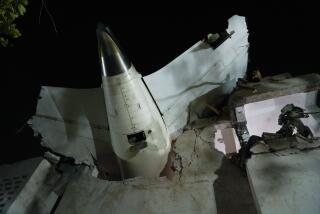Boeing, Citing Asia, Predicts 90 Lost Orders Over the Next 5 Years
- Share via
SEATTLE — Boeing Co., the world’s largest aircraft maker, expects to lose about 90 aircraft orders over the next five years because of the Asian financial crisis, based on predictions released Thursday in the company’s annual market forecast.
Some Asian airlines have delayed deliveries of planes, but none so far has canceled any orders, said Bruce Dennis, vice president of marketing for Boeing Commercial Airplane Group.
“There are one or two of them that are on the ropes. So stay tuned,” he said in a conference call.
Asia and the Pacific are Boeing’s fastest-growing markets. Boeing estimates Asia-Pacific airlines will buy $427 billion in aircraft from all sources over the next 20 years, compared with $332 billion in North America and $345 billion in Europe.
The company said it is extending financial help to a growing number of Asian customers, which account for about 30% of its order backlog. Dennis declined to identify the airlines by name or country.
The report forecast that some of the weaker Asian economies will sink into recessions lasting 12 to 18 months. Economies should return to normal in four to five years.
For all commercial jet manufacturers, Asia’s troubles will result in about 150 lost orders between now and 2003, the report said. Boeing traditionally has about 60% of the global jetliner market, Dennis said.
The report predicted that Asia’s economic woes would not spread beyond the region.
The company also forecast that small airplanes--those with a single aisle--will account for seven out of 10 airplanes delivered over the next two decades. Airplanes of this size, including Boeing 717s, 737s and 757s, will account for 43% of the money invested in new airplanes, or 12,260 aircraft.
Published annually by Boeing, the 20-year forecast is used by the company’s customers and suppliers and the industry as a whole. It was delayed about two months this year because of uncertainty in Asia.
Boeing has been struggling with production problems since October. Last month it said that assembly line bottlenecks on its updated 737 jetliners would continue through the end of the year.
Boeing uses the forecast in deciding its production schedule.
It also uses the forecast in deciding which airplanes to develop.
“This forecast was the basis for our decision not to build an airplane larger than today’s 747,” Dennis said.
Boeing shares rose 19 cents Thursday to close at $43.94 on the New York Stock Exchange.
*
Associated Press and Bloomberg News were used in compiling this report.
More to Read
Inside the business of entertainment
The Wide Shot brings you news, analysis and insights on everything from streaming wars to production — and what it all means for the future.
You may occasionally receive promotional content from the Los Angeles Times.










